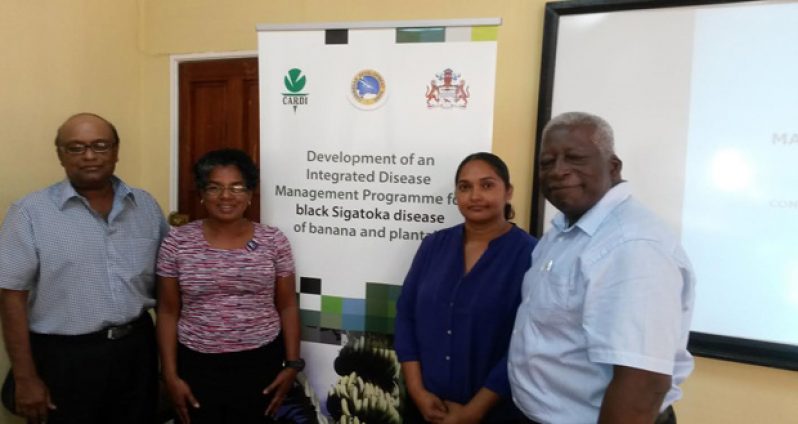VARIETIES of bananas and plantains that are resistant to the Black Sigatoka Disease (BSD) are to be field-tested by early next year.Dr Oudho Homenauth, Chief Executive Officer of the National Agricultural Research and Extension Institute (NAREI), said that a number of BSD-resistant varieties from Nigeria and from as far as Belgium are currently in tissue culture form at the NAREI lab at Mon Repos.

Tissue culture is a process that, over a short period , involves exposing plant tissue to a regimen of nutrients, hormones, and light under sterile laboratory conditions to produce many new plants, each being a clone of the original mother plant.
Dr Homenauth said the field- testing would be the first time these BSD-resistant varieties will be introduced to Guyana, marking a new dimension of the NAREI mission — intensification of vegetable production for both local and export markets.
He made these disclosures during the opening session of a two-week training programme for agricultural technicians and farmers on the “Integrated disease management of Black Sigatoka disease (BSD)”.
That programme is funded by the Caribbean Development Bank (CDB), and is being implemented by the Caribbean Agricultural Research and Development Institute (CARDI), in collaboration with NAREI.
Guyana is one of four countries benefiting from the programme; the others are St Lucia, St Vincent and the Grenadines, and Dominica.
The programme in Guyana, being held at the NAREI Headquarters at Mon Repos, also has a geographic information system (GIS) component, including the use of technology such as drones and the use of satellites for disease monitoring and management, lead specialist Sharon Jones, who is a plant pathologist, disclosed.
Other resource persons are CARDI Consultant Somwattie DeSouza and Dr Robert Power, a Surinamese plant pathologist who specialises in fungal and bacterial diseases.
The Black Sigatoka Disease is caused by the Mycosphaerella fijiensis Leach, and is an important foliar disease of plantains in Guyana. First reported in 2008, it has since caused significant reduction in bunch weight and subsequent yield losses. In Guyana, BSD is currently managed mainly by the use of fungicides.
The BSD is the most damaging leaf disease of bananas and plantain worldwide. Most areas of the tropics and subtropics are affected, with reported losses of between 30% and 50%.
This capacity-building workshop is one of three actions taking place under the CARDI/CDB-funded project ‘Development of an Integrated Disease Management Programme for Black Sigatoka Disease’ in Guyana, Dominica, St. Vincent and the Grenadines, and St. Lucia.
The other two are the development of an integrated disease management (IDM) plan for BSD, and the introduction and evaluation of BSD-tolerant varieties.
It is envisioned that these three actions will work together, synergistically, to significantly improve disease management, resulting in higher yields for farmers.
By Clifford Stanley



.jpg)








